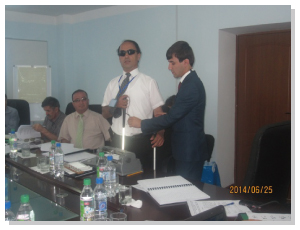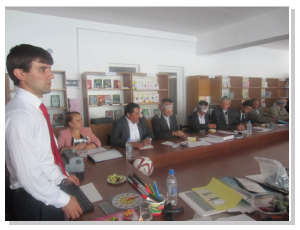- HOME
- Alumni News
- Activity Reports
- Siyovush’s Report
Activity Reports
Siyovush’s Report
Development of a training module for teachers to teach the Braille system to blind children
In November 2013 the UNICEF Representative in Tajikistan together with Tajik Public Blind Organization has granted a project called "Development of a training module for school teachers who teach blind children." This project was approved in April 2014. Beginning in the month of May, three specialists, Siyovush Iliasov, Kurbonali Normatov and Maya Kabirova – who know Braille – began to compile information for this teacher training module. The module would be intended for teachers who would teach blind children in special needs and public schools. The focus was set on training modules in Russia, Kazakstan and Litvia. During the preparation of the training module, the specialists took into account all the needs of blind children focusing on our national mentality of our society. The newly developed training module has 8 chapters, and includes the following topics:
1. The story of Braille. Louis Braille - the founder of the educational system for the blind.
2. Typhlo-pedagogic.
3. Orientation
4. Methods for the study of Braille.
5. Methods for the teaching of mathematics in Braille.
6. Methods technique to touch.
7. Technology and the latest technology for the Blind.
8. Inclusive education.
The main objective of this training module was that all blind children with the help of their teachers who know the system, would be able to learn Braille as an education tool. It is because, without knowledge of Braille, a blind child is not able to improve the level of literacy. In this regard, the drafters took into account the training module on a level with the study of Braille and other necessary items teaching methods for education of blind children.
It should be noted that on the basis of this training module all teachers can get information about the history of the appearance of the Braille system, such as when and by whom the system was created. In the second chapter, the drafters provide more detailed information on educational levels, and the third chapter gives examples of how to improve the orientation in order to navigate a blind child in the environment before learning Braille. The most important theme of this training module is to study Braille. Teachers need to know how to teach a blind child – for instance, how should they hold the stylus? How should they use the slate? How could children learn Braille using a packing-braille? In what way can a teacher more easily teach Braille to a blind child? How could children read and write? How could teachers correct mistakes? – and so on.

Another major focus of the training module was set on the use of tactile sensation – that is, using a hand and fingers while reading letters and solving mathematical examples and problems. Encouragingly, during the preparation of the training module, the specialists’ particular attention was paid to the study of modern technology for the blind. Indeed today's latest technology can create a better and comfortable learning environment for children with visual impairments. With the aid of computers children will be able to obtain new information on existing training methods and receive daily news through internet websites. People can independently get any news on existing technologies for blind people.

With the introduction of the concept of inclusive education, blind children can receive education together with non-disabled children, instead of being isolated from the rest of society.
During the project two seminars were held for teachers who work in the Republican Institution for Teachers Training. The first workshop was held on June 25, 2014 and it was attended by 22 people, including the representatives of the Ministry of Education and Science of Tajikistan, the representatives of the Department of Education of the Dushanbe-city, Academy of Pedagogical Sciences and the Society for Disabled “Imkoniyat” in Dushanbe. After the first workshop, comments were provided from the Ministry of Education and Science, Academy of Education and Republican Institution for Teachers Training. Accordingly, our specialists corrected the shortcomings that existed in the training module. For example, the representatives of the Academy on the proposal of the formation of Tajikistan suggested the training module include a chapter on typhlo-pedagogic and typhlo-psychology. Moreover, the representatives of the Republican Institution for Teachers Training and Education Academy said that more information about the existing specialized technologies for the blind should be incorporated in the module. Thus, the module designers added a lot of information about that in order for blind children to learn these techniques.
Upon reflecting the received comments in the training module, it was sent to professionals who know the Tajik language at a professional level to correct grammatical mistakes.
Then on October 9, 2014, the two-day training was held for teachers of the Republican Institution for Teachers Training institution and teachers from the regions of Tajikistan. This training was attended by 32 people. It was encouraging that many participants took part in the training with interest and got a lot of information about the study of Braille for blind children. The participants were from different regions such as: Isfara, Chikalovsk, Asht, Zafarobod, Kanibodom, Bobojon Gafurov, Hissor, Vahdat, Nurobod, Faizobod and so on. All the training participants saw in practice how Braille and orientation of blind children could be leant. It was interesting that all these teachers very quickly mastered the practical methods by which teachers could work with the blind child. We believe that our project was implemented at a high level, as the prepared training module could immediately be put into practice for the study of Braille. The module included pictures to improve the performance of teachers.
It is gratifying that the training module held on September 24, 2014 was approved for printing by the National Council of the Ministry of Education and Science of Tajikistan. In connection with this, now employees of Institution for Teachers Training can work on the basis of this training module to prepare teachers to improve the level of education for blind children studying in public schools.
Taking this opportunity, we want to thank the leadership of UNICEF in Tajikistan for generous support . We sincerely hope that in the future we will continue our cooperation at a closer level.
Siyovush Iliasov (Tajikistan)
13th Duskin program trainee




